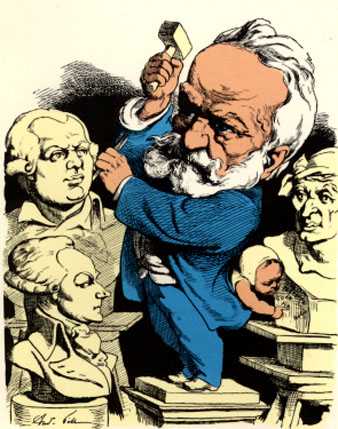units
image banks
--l'assiette au beurre
--Les Quatre Saisons de la Kultur
 |
From: Ninety -Three
Among these men full of passions were mingled men filled with
dreams. Utopia was there under all its forms,—under its warlike form, which
admitted the scaffold, and under its innocent form, which would abolish
capital punishment; phantom as it faced thrones; angel as it regarded the
people. Side by side with the spirits that fought were the spirits that
brooded. These had war in their heads, those peace. One brain, Carnot,
brought forth fourteen armies; another intellect, Jean Debry, meditated
a universal democratic federation.
Amid this furious eloquence, among these shrieking and growling
voices, there were fruitful silences. Lakanal remained voiceless, and combined
in his thoughts the system of public national education; Lanthenas held
his peace, and created the primary schools; Revellière Lépaux
kept still, and dreamed of the elevation of Philosophy to the dignity of
Religion. Others occupied themselves with questions of detail, smaller
and more practical. Guyton Morveaux studied means for rendering the hospitals
healthy; Maire, the abolition of existing servitudes; Jean Bon Saint-André,
the suppression of imprisonment for debt and constraint of the person;
Romme, the proposition of Chappe; Duboë, the putting the archives
in order; Coren Fustier, the creation of the Cabinet of Anatomy and the
Museum of Natural History; Guyomard, river navigation and the damming of
the Scheldt. Art had its monomaniacs. On the 21st of January, while the
head of monarchy was falling on the Place de la Revolution, Bézard,
the Representative of the Oise, went to see a picture of Rubens, which
had been found in a garret in the Rue Saint Lazare. Artists, orators, prophets,
men-diants like Danton, child-men like Cloots, gladiators and philosophers,
all had the same goal,—progress. Nothing disconcerted them. The grandeur
of the Convention was, the searching how much reality there is in what
men call the impossible. At one extreme, Robespierre had his eye fixed
on Law; at the other, Condorcet had his fixed on Duty.
Condorcet was a man of reverie and enlightenment. Robespierre
was a man of execution; and sometimes, in the final crises of worn-out
orders, execution means extermination. Revolutions have two currents,—an
ebb and a flow; and on these float all seasons, from that of ice to flowers.
Each zone of these currents produces men adapted to its climate, from those
who live in the sun to those who dwell among the thunderbolts.